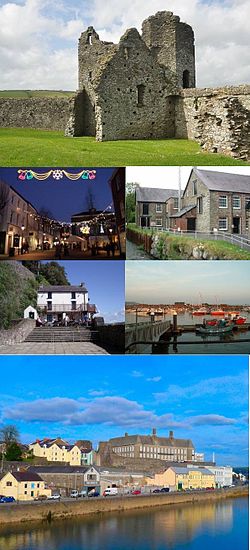Carmarthenshire
|
County of Carmarthenshire Sir Gaerfyrddin |
||
|---|---|---|
| unitary authority | ||
 |
||
|
||
 |
||
| County town | Carmarthen | |
| Largest town | Llanelli | |
| Government | ||
| • Type | Carmarthenshire County Council | |
| Area | ||
| • Total | 2,395 km2 (925 sq mi) | |
| Area rank | Ranked 3rd | |
| Population (2011) | ||
| • Total | 183,800 | |
| • Rank | Ranked 4th | |
| • Density | 75/km2 (190/sq mi) | |
| • Density rank | Ranked 18th | |
| • Ethnicity | 99.4% White | |
| Welsh language | ||
| • Rank | Ranked 3rd | |
| • Any skills | 63.6% | |
| Geocode | 00NU (ONS) W06000010 (GSS) |
|
| ISO 3166 code | GB-CMN | |
Carmarthenshire (Welsh: Sir Gaerfyrddin; [siːr gɑːɨrˈvərðɪn] or informally Sir Gâr) is a unitary authority in the south-west of Wales and is the largest of the thirteen historic counties of Wales. The three largest towns are Llanelli, Carmarthen and Ammanford. Carmarthen is the county town and administrative centre of Carmarthenshire, but the most populous settlement is Llanelli.
Carmarthenshire has been inhabited since prehistoric times. The town of Carmarthen was founded by the Romans, and the region was part of the Principality of Deheubarth during the High Middle Ages. It saw turbulent times during the invasion by the Normans in the 12th and 13h centuries before it was subjugated, along with other parts of Wales, by Edward I of England. There was further unrest in the early 15th century when the Welsh rebelled under Owain Glyndŵr, and more strife during the English Civil War in the 17th century.
Carmarthenshire is mainly an agricultural county, apart from the southeastern part which at one time was heavily industrialised with coal mining, steel-making and tin-plating. In the north of the county the woollen industry was very important in the 18th century. Nowadays the economy of the county depends on agriculture, forestry, fishing and tourism. With the decline in its industrial base and the low profitability of the livestock sector, Carmarthenshire is economically one of the worst-performing regions in the United Kingdom.
Although Carmarthenshire is less frequented as a tourist destination than some other counties in Wales, it offers a wide range of outdoor activities. Much of the coast is fairly flat; it includes the Millennium Coastal Park, which extends for ten miles to the west of Llanelli; the National Wetlands Centre; a championship golf course; and the harbours of Burry Port and Pembrey. Further west are the sandy beaches at Llansteffan and Pendine, and Dylan Thomas' boathouse at Laugharne. Further inland there are a number of medieval castles, hillforts and standing stones.
...
Wikipedia

